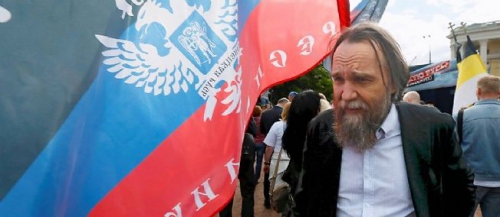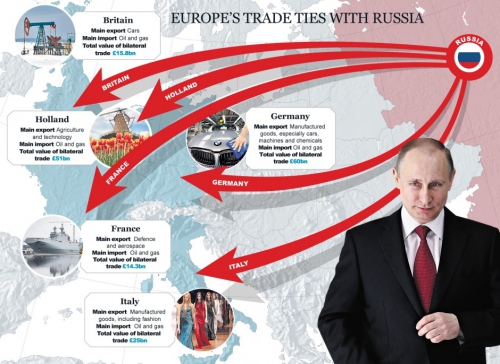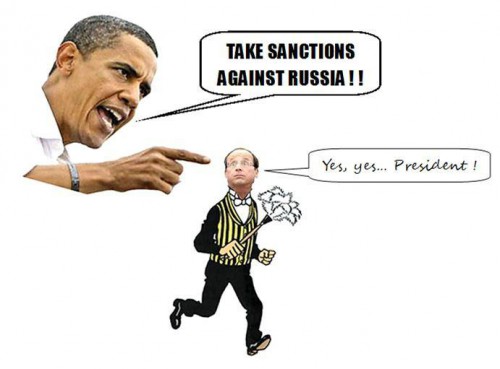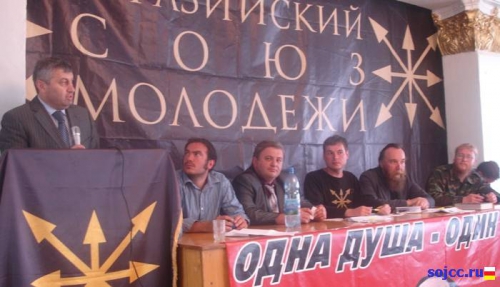
EEUU impone sanciones contra Alexander Dugin, la Unión Euroasiática de la Juventud, y dos de sus dirigentes: Andrey Kovalenko y Pavel Kanishchev
Ex: http://paginatransversal.wordpress.com
Los sancionados eurasistas son Alexander Dugin, Andrey Kovalenko, y Pavel Kanishchev, además de la Unión Euroasiática de la Juventud.
Las sanciones congelan los bienes de los señalados e impide a cualquier entidad financiera de Estados Unidos hacer negocios con los individuos o instituciones sancionados. Estas sanciones siguen los pasos de las acciones emprendidas por la Unión Europea y Canadá el pasado 16 de febrero, que fueron prorrogadas la semana pasada. Por otra parte, incluyen a Oleg Kozyura, jefe del Servicio Federal de Migración de Rusia en Sebastópol (Crimea), al que EE.UU.
EFE | ÚN.- Estados Unidos anunció hoy nuevas sanciones contra una entidad financiera rusa, una organización política, y catorce personas, entre ellos el ex primer ministro de Ucrania Mykola Azárov, por su papel en el conflicto en el este del país.
Las sanciones congelan los bienes de los señalados e impide a cualquier entidad financiera de Estados Unidos hacer negocios con los individuos o instituciones sancionados.
“Desde el inicio de esta crisis, hemos demostrado que vamos a imponer costos a los que violan la soberanía y la integridad territorial de Ucrania”, indicó el subsecretario interino para Terrorismo e Inteligencia Financiera del Departamento del Tesoro de EE.UU., Adam Szubin, en un comunicado.
Entre los sancionados también hay dos altos funcionarios del Gobierno del expresidente de Ucrania Víktor Yanukóvich.
Esos señalados son el ex primer viceministro Serhiy Arbuzov y la exministra de Salud Raisa Bogatyrova, que está siendo investigada por malversación de fondos estatales “a gran escala” y la transferencia ilegal de estos fondos fuera del país.
El Departamento del Tesoro indicó que los sancionados han sido incluidos en su “lista negra” por ser responsables o cómplices de “amenazar la paz, la seguridad, la estabilidad, la soberanía y la integridad territorial de Ucrania”.
El listado también incluye ocho a separatistas ucranianos y un pro-separatista ruso, así como la organización Unión Euroasiática de la Juventud, rama juvenil del ultranacionalista Movimiento Euroasiático ruso, a la que EE.UU. acusa de estar reclutando individuos con experiencia militar para combatir en Ucrania.
Se trata de Roman Lyagin, que sirvió como jefe de la Comisión Electoral Central de la autoproclamada República Popular de Donetsk; su ex “ministro de Defensa”, el comandante rebelde Serhii Zdriliuk; el ex “ministro de Seguridad”, Alexander Khodakovsky, y Alexandr Karaman, que ha ejercido varios cargos en el gobierno de esa región.
Figuran, además, Ekaterina Gubareva, ex “ministra de Exteriores”, de la autoproclamada República Popular de Donetsk; así como los líderes de la autoproclamada República Popular de Lugansk Sergei Abisov y Yuriy Ivakin.
Por otra parte, incluyen a Oleg Kozyura, jefe del Servicio Federal de Migración de Rusia en Sebastópol (Crimea), al que EE.UU. acusa de la expedición sistemática y rápida de pasaportes rusos a residentes en Crimea.
Además, también sancionó al Banco Comercial Nacional Ruso, al que el Tesoro acusa de trasladarse a la región ucraniana de Crimea después de que Moscú se anexionase ese territorio en 2014.
Estas sanciones siguen los pasos de las acciones emprendidas por la Unión Europea y Canadá el pasado 16 de febrero, que fueron prorrogadas la semana pasada.
“Si Rusia sigue apoyando la actividad desestabilizadora en Ucrania y viola los acuerdos y la puesta en práctica del plan de Minsk (para lograr una solución pacífica al conflicto), los costos sustanciales que ya enfrenta seguirán aumentando”, advirtió Szubin.
Fuente: Libreprensa
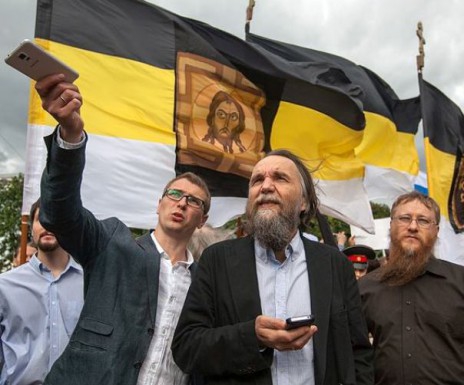
Originales del Departamento del Tesoro de los EEUU:
Treasury Announces New Designations of Ukrainian Separatists and their Russian Supporters
3/11/2015
Action Targets Eight Ukrainian Separatists, a Russian Pro-Separatist Organization and Three of its Leaders, a Crimean Bank, and Three Former Yanukovych Officials
WASHINGTON – The United States supports the Minsk agreements and views them as the best means to a diplomatic resolution of the conflict in eastern Ukraine. The proof of Russia’s peaceful intentions in Ukraine would be in its full and unambiguous implementation of the September Minsk agreements and the February 12 Minsk Implementation Plan. Recent assaults by Russian-armed separatists, however, particularly those that have targeted Debaltseve and Mariupol – two cities that unquestionably lie outside of separatist-occupied territory according to the September 19 ceasefire line – constitute violations of the letter and spirit of the Minsk agreements.
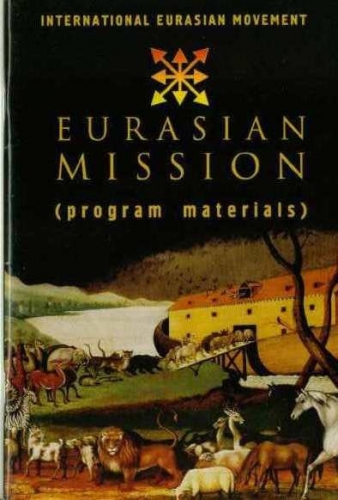 As part of an ongoing effort to hold accountable those responsible for violations of Ukraine’s sovereignty and territorial integrity, the U.S. Department of the Treasury today imposed sanctions on eight Ukrainian separatists and one pro-separatist Russian entity and its leaders pursuant to E.O. 13660 for being responsible for or complicit in actions or policies that threaten the peace, security, stability, sovereignty, or territorial integrity of Ukraine, for being leaders of such entities, or for asserting governmental authority over a part or region of Ukraine without the authorization of the Government of Ukraine. Additionally, Treasury today designated and blocked the assets of one bank pursuant to E.O. 13685 for operating in the Crimea region of Ukraine, and three individuals pursuant to E.O. 13660 for the misappropriation of state assets of Ukraine. These sanctions follow similar action taken by the European Union and Canada on February 16. We continue to work to remain in lockstep with our international partners in our efforts to incentivize a diplomatic resolution to the crisis in Ukraine.
As part of an ongoing effort to hold accountable those responsible for violations of Ukraine’s sovereignty and territorial integrity, the U.S. Department of the Treasury today imposed sanctions on eight Ukrainian separatists and one pro-separatist Russian entity and its leaders pursuant to E.O. 13660 for being responsible for or complicit in actions or policies that threaten the peace, security, stability, sovereignty, or territorial integrity of Ukraine, for being leaders of such entities, or for asserting governmental authority over a part or region of Ukraine without the authorization of the Government of Ukraine. Additionally, Treasury today designated and blocked the assets of one bank pursuant to E.O. 13685 for operating in the Crimea region of Ukraine, and three individuals pursuant to E.O. 13660 for the misappropriation of state assets of Ukraine. These sanctions follow similar action taken by the European Union and Canada on February 16. We continue to work to remain in lockstep with our international partners in our efforts to incentivize a diplomatic resolution to the crisis in Ukraine.
“From the start of this crisis, we have demonstrated that we will impose costs on those who violate the sovereignty and territorial integrity of Ukraine. That includes individuals, organizations, businesses, and the governments that support them,” said Acting Under Secretary for Terrorism and Financial Intelligence Adam J. Szubin. “If Russia continues to support destabilizing activity in Ukraine and violate the Minsk agreements and implementation plan, the already substantial costs it faces will continue to rise.”
Undermining Ukraine’s Sovereignty – Executive Order 13660
Roman Lyagin has served as the chairman of the Central Election Commission (CEC) and as minister of social and labor policy of the self-proclaimed Donetsk People’s Republic (DPR). In his role as CEC chairman, he helped organize a number of votes in the region that were denounced as illegal by the government of Ukraine in Kyiv, including a May 2014 “independence referendum” and a November 2014 election for leadership positions in the self-proclaimed DPR. In addition, Lyagin actively interfered with the internationally-recognized national Ukrainian elections by confiscating ballots and preventing voting in the May 2014 Ukrainian parliamentary elections and the October 2014 election for Ukraine’s President. He has been designated for having asserted governmental authority over a part or region of Ukraine without the authorization of the Government of Ukraine, and for having engaged in actions that have undermined democratic processes in Ukraine.
Yuriy Ivakin is being designated pursuant to E.O. 13660 for asserting governmental authority over a part or region of Ukraine without the authorization of the Government of Ukraine, and for being a leader of the self-proclaimed Luhansk People’s Republic (LPR), an entity whose property and interest in property are blocked by this order. Ivakin has led the ministry of internal affairs of the self-proclaimed LPR. In May 2014, Ivakin, accompanied by representatives of the self-proclaimed LPR, entered the regional directorate of the Ukrainian Ministry of Internal Affairs in Luhansk and declared himself the head of the regional directorate.
Aleksandr Karaman has held a number of leadership posts within the self-proclaimed DPR, including minister for social and labor policy, foreign minister, deputy prime minister, and deputy chairman of the council of ministers. Karaman is being designated for being a leader of the self-proclaimed DPR, and for threatening the peace, stability, sovereignty, and territorial integrity of Ukraine.
Oleksandr Khodakovskyy is being designated pursuant to E.O. 13660 for being responsible for or complicit in actions or policies that threaten the peace, security, stability, sovereignty, or territorial integrity of Ukraine, and for asserting governmental authority over a part or region of Ukraine without the authorization of the Government of Ukraine. Khodakovskyy is the former head of the self-proclaimed DPR security service, and is the chief of the Vostok Battalion, a unit of the DPR militia that engaged in fighting with the Ukrainian military at Donetsk Airport.
Senior “rebel commander” Serhii Zdriliuk served as an aide to Igor Girkin (a.k.a Igor Strelkov), former “defense minister” of the self-proclaimed DPR. Zdriliuk and Girkin were involved in the takeover of Ukraine’s Crimea region that led to Russia’s illegal annexation of the region in March 2014. He is being designated for actions that threaten the territorial integrity of Ukraine, and has acted on behalf of the self-proclaimed DPR. Girkin was designated in June 2014 pursuant to E.O. 13660.
The Eurasian Youth Union has actively recruited individuals with military and combat experience to fight on behalf of the self-proclaimed DPR and has stated that it has a covert presence in Ukraine. Aleksandr Dugin, Andrey Kovalenko, and Pavel Kanishchev are leaders of the Eurasian Youth Union. This group and its leaders are being designated for being responsible for or complicit in actions or policies that threaten the peace, security, stability, or sovereignty or territorial integrity of Ukraine.
Ekaterina Gubareva is being designated for being responsible for or complicit in actions or policies that threaten the peace, security, stability, sovereignty, or territorial integrity of Ukraine. Gubareva previously held the title of foreign minister of the self-proclaimed DPR, and has engaged in efforts to transfer funds from Russia to the DPR. She was a signatory to an October 2014 statement signed by self-proclaimed DPR and LPR leaders and representatives refusing to return to the Government of Ukraine control of the Ukrainian side of the international border with Russia.
Sergei Abisov was appointed minister of interior affairs of the self-proclaimed Republic of Crimea in May 2014. Abisov is being designated because he has asserted governmental authority over a part or region of Ukraine without the authorization of the Government of Ukraine.
Oleg Kozyura is the head of the Federal Migration Service of Russia in Sevastopol, Crimea, and is responsible for the systematic and expedited issuance of Russian passports for the residents of Crimea. As leader of the Federal Migration Service of Russia in Sevastopol, Kozyura facilitated the issuance of more than 260,000 Russian passports to the citizens of Sevastopol and other regions. Kozyura is being designated because he leads an entity that has, or whose members have, asserted governmental authority over a part of Ukraine without the authorization of the Government of Ukraine.
Crimean Bank – Executive Order 13685
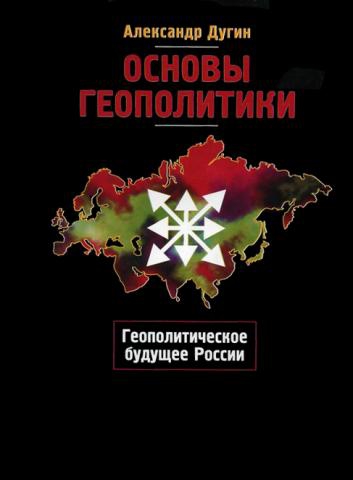 Russian National Commercial Bank (RNCB) is being designated today pursuant to E.O. 13685 for operating in the Crimea region of Ukraine. RNCB had no presence in the Crimea region of Ukraine prior to its occupation and attempted annexation by Russia and Russian authorities have used the bank to facilitate its illegal efforts to incorporate Crimea into the Russian Federation. Following the annexation, RNCB bought or took over branches of retreating banks and now operates the largest banking network in Crimea.
Russian National Commercial Bank (RNCB) is being designated today pursuant to E.O. 13685 for operating in the Crimea region of Ukraine. RNCB had no presence in the Crimea region of Ukraine prior to its occupation and attempted annexation by Russia and Russian authorities have used the bank to facilitate its illegal efforts to incorporate Crimea into the Russian Federation. Following the annexation, RNCB bought or took over branches of retreating banks and now operates the largest banking network in Crimea.
Former Yanukovych Officials and Misappropriation of Ukrainian State Assets – Executive Order 13660
Mykola Azarov is the former Prime Minister of Ukraine. Azarov is being designated because he is responsible for the misappropriation of state assets of Ukraine.
Serhiy Arbuzov is the former First Deputy Prime Minister and former acting Prime Minister of Ukraine. He is being designated for acting on behalf of former Ukrainian President Viktor Yanukovych as First Deputy Prime Minister and as a member of Yanukovych’s inner circle. Arbuzov was a leading member of a group of Yanukovych political appointees responsible for key economic positions in the government.
Raisa Bohatyriova is the former Minister of Health of Ukraine. She is currently under investigation in Ukraine for the large-scale embezzlement of state funds and the illegal transfer of those funds outside the territory of Ukraine. She is being designated for the misappropriation of state assets of Ukraine.
All the individuals and entities designated today are blocked. Their property and interests in property within U.S. jurisdiction are frozen and U.S. persons are generally prohibited from doing business with them.
For identifying information on the individuals and entities named in this release, please click here.
###
Fuente: ht tp://www.treasury.gov/press-center/press-releases/Pages/jl9993.aspx
Ukraine-related Designations
3/11/2015
OFFICE OF FOREIGN ASSETS CONTROL
Specially Designated Nationals List Update
The following individuals have been added to OFAC’s SDN List:
ABISOV, Sergei (a.k.a. ABISOV, Sergei Vadimovich); DOB 27 Nov 1967; POB Simferopol, Crimea, Ukraine (individual) [UKRAINE-EO13660].
ARBUZOV, Serhiy (a.k.a. ARBUZOV, Sergey G.; a.k.a. ARBUZOV, Serhiy Hennadiyovych); DOB 24 Mar 1976; POB Donetsk, Ukraine; Former First Deputy Prime Minister of Ukraine (individual) [UKRAINE-EO13660].
AZAROV, Mykola Yanovych (a.k.a. AZAROV, Mykola Nikolai Yanovych; a.k.a. PAKHLO, Nikolai Yanovich); DOB 17 Dec 1947; POB Kaluga, Russia; Former Prime Minister of Ukraine (individual) [UKRAINE-EO13660].
BOHATYRIOVA, Raisa Vasylivna (a.k.a. BOGATYRIOVA, Raisa; a.k.a. BOGATYROVA, Raisa; a.k.a. BOGATYRYOVA, Raisa; a.k.a. BOHATYREVA, Raisa; a.k.a. BOHATYROVA, Raisa; a.k.a. BOHATYRYOVA, Raisa; a.k.a. BOHATYRYOVA, Rayisa); DOB 06 Jan 1953; POB Bakal, Chelyabinsk, Russia (individual) [UKRAINE-EO13660].
DUGIN, Aleksandr (a.k.a. DUGIN, Aleksandr Gelyevich; a.k.a. DUGIN, Alexander Gelyevich); DOB 07 Jan 1962 (individual) [UKRAINE-EO13660].
GUBAREVA, Ekaterina (a.k.a. GUBAREVA, Yekaterina); DOB 05 Jul 1983 (individual) [UKRAINE-EO13660].
IVAKIN, Yuriy Vladimirovich (a.k.a. IVAKIN, Yurii); DOB 13 Aug 1954; POB Perevalsk, Ukraine (individual) [UKRAINE-EO13660].
KANISHCHEV, Pavel; DOB 1986 (individual) [UKRAINE-EO13660].
KARAMAN, Aleksandr (a.k.a. CARAMAN, Aleksandru; a.k.a. KARAMAN, Alexander; a.k.a. KARAMAN, Oleksandr); DOB 26 Jul 1956; POB Republic of Mordovia, Russia (individual) [UKRAINE-EO13660].
KHODAKOVSKYY, Oleksandr Sergeyevich (a.k.a. KHODAKOVSKIY, Aleksandr; a.k.a. KHODAKOVSKY, Alexander); DOB 18 Dec 1972; POB Donetsk, Ukraine (individual) [UKRAINE-EO13660].
KOVALENKO, Andrey; DOB 30 Dec 1985 (individual) [UKRAINE-EO13660].
KOZYURA, Oleg Grigorievich (a.k.a. KOZYURA, Oleg Grigoryevich); DOB 19 Dec 1962; POB Zaporozhye, Ukraine; Head of the Office of the Federal Migration Service in the City of Sevastopol (individual) [UKRAINE-EO13660].
LYAGIN, Roman (a.k.a. LIAGIN, Roman; a.k.a. LIAHIN, Roman; a.k.a. LYAHIN, Roman); DOB 30 May 1980; POB Donetsk, Ukraine (individual) [UKRAINE-EO13660].
ZDRILIUK, Serhii Anatoliyovych (a.k.a. ZDRILIUK, Serghiei; a.k.a. ZDRILYUK, Sergei; a.k.a. ZDRILYUK, Sergey; a.k.a. ZDRYLYUK, Serhiy); DOB 23 Jun 1972; POB Vinnytsia Region, Ukraine; nationality Ukraine; citizen Russia (individual) [UKRAINE-EO13660].
The following entities have been added to OFAC’s SDN List:
EURASIAN YOUTH UNION, Russia 3, Bagrationovskiy Proezd, House 7, Area 20 B, Office 405, Moscow 121087, Russia; Website http://rossia3.ru; Email Address esm@rossia3.ru [UKRAINE-EO13660].
RUSSIAN NATIONAL COMMERCIAL BANK (a.k.a. RNKB OAO; a.k.a. ROSSISKI NATSIONALNY KOMMERCHESKI BANK OTKRYTOE AKTSIONERNOE OBSHCHESTVO; a.k.a. “RNCB”), d. 9 korp. 5 ul.Krasnoproletarskaya, Moscow 127030, Russia; SWIFT/BIC RNCO RU MM; Website http://www.rncb.ru; Email Address rncb@rncb.ru; BIK (RU) 044525607; Registration ID 1027700381290 (Russia); Tax ID No. 7701105460 (Russia); Government Gazette Number 09610705 (Russia) [UKRAINE-EO13685].
Fuente: ht tp://www.treasury.gov/resource-center/sanctions/OFAC-Enforcement/Pages/20150311.aspx
Desde La Cuarta Teoría Política en español* queremos mostrar nuestro apoyo y reconocimiento a los camaradas sancionados por la mafia imperialista estadounidense y sus cipayos.
*Naturalmente, desde la Página Transversal nos unimos a ese apoyo y reconocimiento.
Fuente: La Cuarta Teoría en español



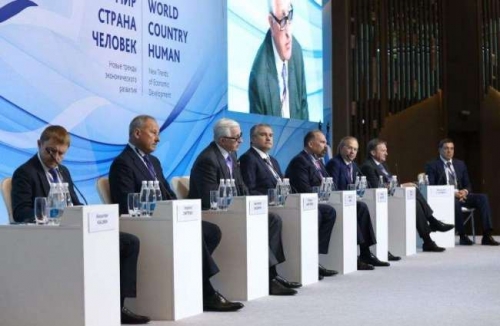

 del.icio.us
del.icio.us
 Digg
Digg

 As part of an ongoing effort to hold accountable those responsible for violations of Ukraine’s sovereignty and territorial integrity, the U.S. Department of the Treasury today imposed sanctions on eight Ukrainian separatists and one pro-separatist Russian entity and its leaders pursuant to E.O. 13660 for being responsible for or complicit in actions or policies that threaten the peace, security, stability, sovereignty, or territorial integrity of Ukraine, for being leaders of such entities, or for asserting governmental authority over a part or region of Ukraine without the authorization of the Government of Ukraine. Additionally, Treasury today designated and blocked the assets of one bank pursuant to E.O. 13685 for operating in the Crimea region of Ukraine, and three individuals pursuant to E.O. 13660 for the misappropriation of state assets of Ukraine. These sanctions follow similar action taken by the European Union and Canada on February 16. We continue to work to remain in lockstep with our international partners in our efforts to incentivize a diplomatic resolution to the crisis in Ukraine.
As part of an ongoing effort to hold accountable those responsible for violations of Ukraine’s sovereignty and territorial integrity, the U.S. Department of the Treasury today imposed sanctions on eight Ukrainian separatists and one pro-separatist Russian entity and its leaders pursuant to E.O. 13660 for being responsible for or complicit in actions or policies that threaten the peace, security, stability, sovereignty, or territorial integrity of Ukraine, for being leaders of such entities, or for asserting governmental authority over a part or region of Ukraine without the authorization of the Government of Ukraine. Additionally, Treasury today designated and blocked the assets of one bank pursuant to E.O. 13685 for operating in the Crimea region of Ukraine, and three individuals pursuant to E.O. 13660 for the misappropriation of state assets of Ukraine. These sanctions follow similar action taken by the European Union and Canada on February 16. We continue to work to remain in lockstep with our international partners in our efforts to incentivize a diplomatic resolution to the crisis in Ukraine. Russian National Commercial Bank (RNCB) is being designated today pursuant to E.O. 13685 for operating in the Crimea region of Ukraine. RNCB had no presence in the Crimea region of Ukraine prior to its occupation and attempted annexation by Russia and Russian authorities have used the bank to facilitate its illegal efforts to incorporate Crimea into the Russian Federation. Following the annexation, RNCB bought or took over branches of retreating banks and now operates the largest banking network in Crimea.
Russian National Commercial Bank (RNCB) is being designated today pursuant to E.O. 13685 for operating in the Crimea region of Ukraine. RNCB had no presence in the Crimea region of Ukraine prior to its occupation and attempted annexation by Russia and Russian authorities have used the bank to facilitate its illegal efforts to incorporate Crimea into the Russian Federation. Following the annexation, RNCB bought or took over branches of retreating banks and now operates the largest banking network in Crimea.